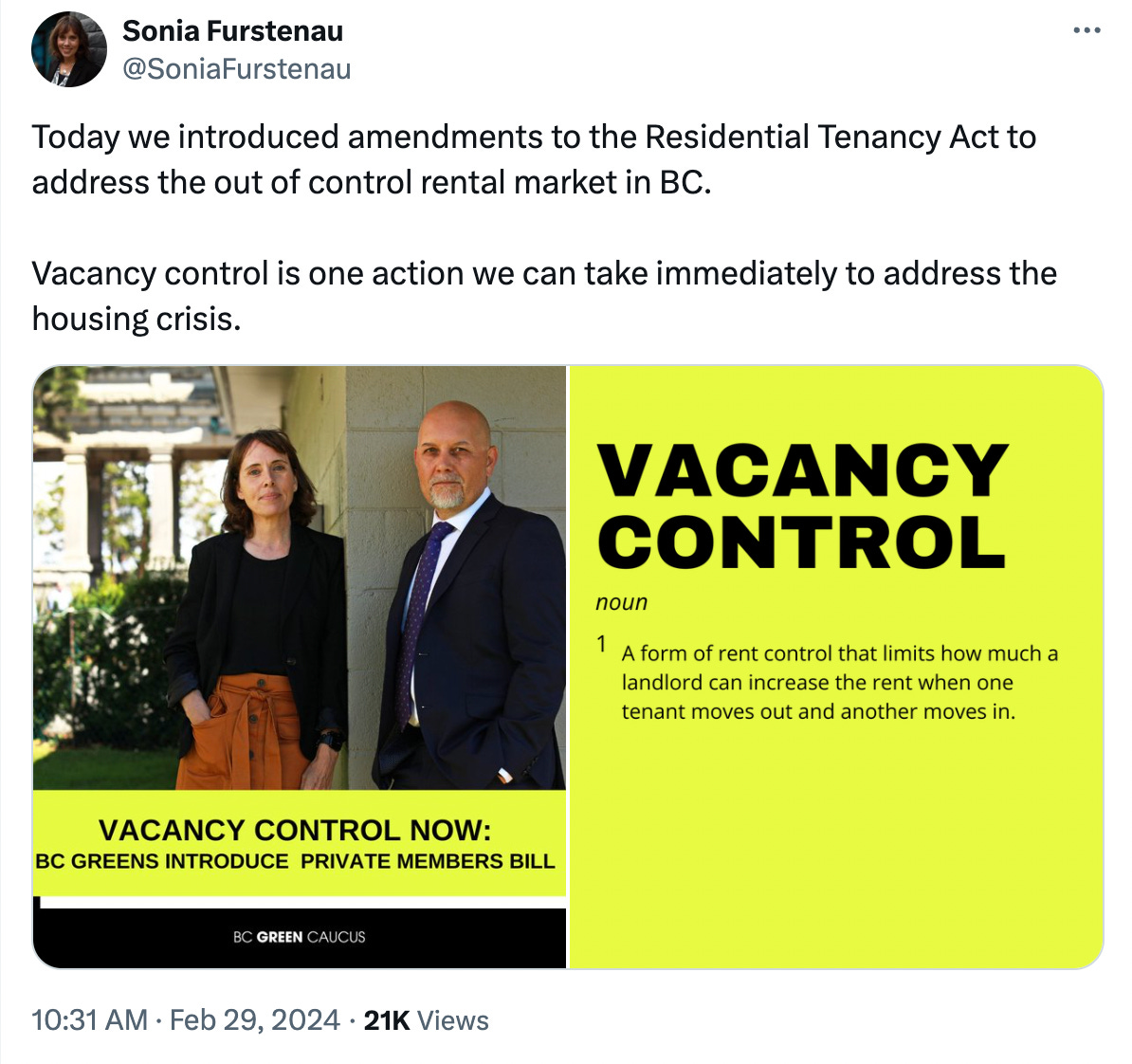March 4, 2024 | Vacancy Control

Happy Monday Morning!
Last week we introduced the home flipping tax. A seductive new tax introduced by the BC Government that will hit evil speculators with a 20% tax on any profits derived from flipping a property within two years. Remember this new tax comes on top of the tax CRA already collects which, for any home flipped within one year of acquisition is deemed active business income, not capital gains.
In other words, this could mean a potential combined tax rate of 73.5% consisting of the 20% BC Homes Flipping tax and the 53.5% top BC marginal tax rate. This is why we believe this well intended tax could have serious ramifications for the pre-sale market moving forward. Investors, after all, account for the lion’s share of pre-sale units due to the very nature of pre-sales being a risky, and speculative investment. They are, in very simple terms, a futures contract.
The very definition of a futures contract is a legal contract to buy or sell something at a predetermined price for delivery at a specified time in the future.
Developers typically require 60% of the building to be pre-sold in order to obtain construction financing from a bank. There is simply no way around this.
So we need to ask ourselves, will investors be willing to risk their capital for new housing supply if their profits are to be taxed 73.5% upon completion?
Maybe investors should just rent out their units upon completion, at least for two years so they can avoid the tax. Wouldn’t this be the right thing to do?
Investors are coming to realize real estate investing in BC is no longer a way one bet. In fact, the profits are seemingly capped but the downside is nearly unlimited.
The BC Government has capped the upside via rent controls, set well below the rate of inflation and the cost of maintaining the investment. Meanwhile the downside is growing via surging interest rates, pushing investors into negative cash flow situations with no ability to raise rents beyond the arbitrary cap while simultaneously pushing resale values lower!
This is not a very compelling investment proposition, and many investors are learning this the hard way.
The most common story I hear today is landlords stuck with surging mortgage payments, and ballooning amortizations, unable to raise rents and hemoraging cash every month.
All of this has created a very unhealthy rental market where the vacancy rate sits under 1%. Tenants don’t want to move, favourably locked into rental units well below markets. Upward mobility has been choked off, and units no longer turnover. When they do turnover the increases are staggering.
According to a recent report from CMHC, turnover rent growth for 2 bedroom units was a staggering 33.5% last year, and 37% in Victoria. Other stritctly rent controlled cities in Ontario are facing the same issue with turnover rents as high as 40% in Toronto.

Quite simply, this is what failed housing policy looks like, but rest assured BC MLA Sonia Furstenau has a solution, vacancy control. Mrs. Furstenau has introduced a private members bill to amend the residential tenancy act in BC to enable vacancy control, a form of rent control that limits how much a landlord can increase the rent when one tenant moves out, and another moves in.

We wish this was satire but it is unfortunately not.
If you want to incentize the private sector to do more of something, ie build more rental housing, capping the profits and dictating prices is the opposite of what you should do.
There’s a reason housing starts are rolling over and many major developers are exiting the Canadian market and ramping up projects in the US. After all, capital is like water, and it flows towards the path of least resistance.
Policy proposals such as rent and vacancy controls will only throttle housing supply further, ultimately impoverishing the very people it’s intended to help.
The economists agree.
1) A survey of 464 economists found that 93% agreed that “a ceiling on rents reduces the quantity and quality of housing available.” (American Economic Review)
2) A Stanford study found that rent control in San Francisco reduced rental supply, led to higher rents on future renters, created gentrification, and reduced housing options for all but the most wealthy people. (Diamond)
3) Numerous studies have shown that rent control incentivizes higher-income earners to stay put, reducing availability for lower-income earners. One famous one was former New York Mayor Ed Koch, who maintained a $475/month rent controlled apartment even while living in the mayoral mansion. This leads to a misallocation of housing resources. (Olsen, Gyourko and Linneman).
My friends, never let politics get in the way of facts.
STAY INFORMED! Receive our Weekly Recap of thought provoking articles, podcasts, and radio delivered to your inbox for FREE! Sign up here for the HoweStreet.com Weekly Recap.
Steve Saretsky March 4th, 2024
Posted In: Steve Saretsky Blog











